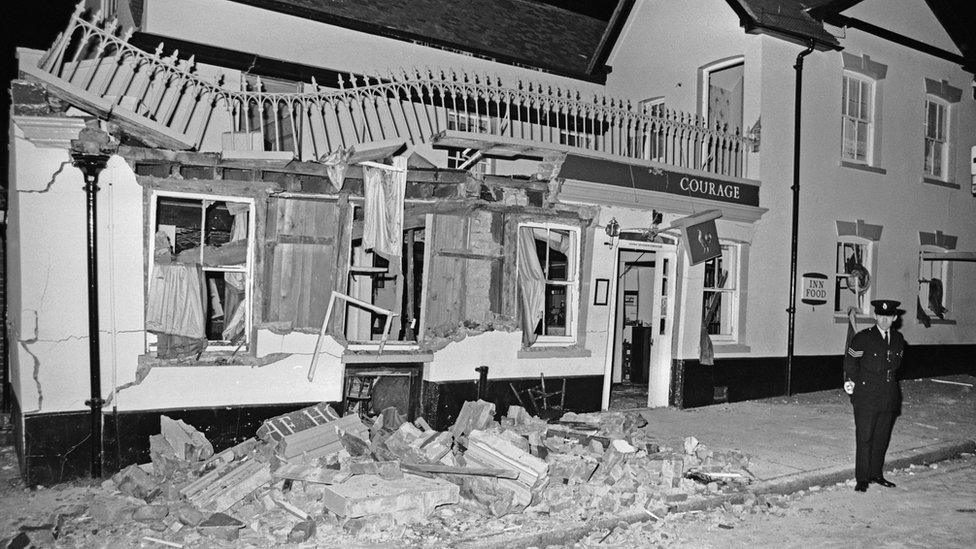Guildford pub bombings police 'seize files'
- Published
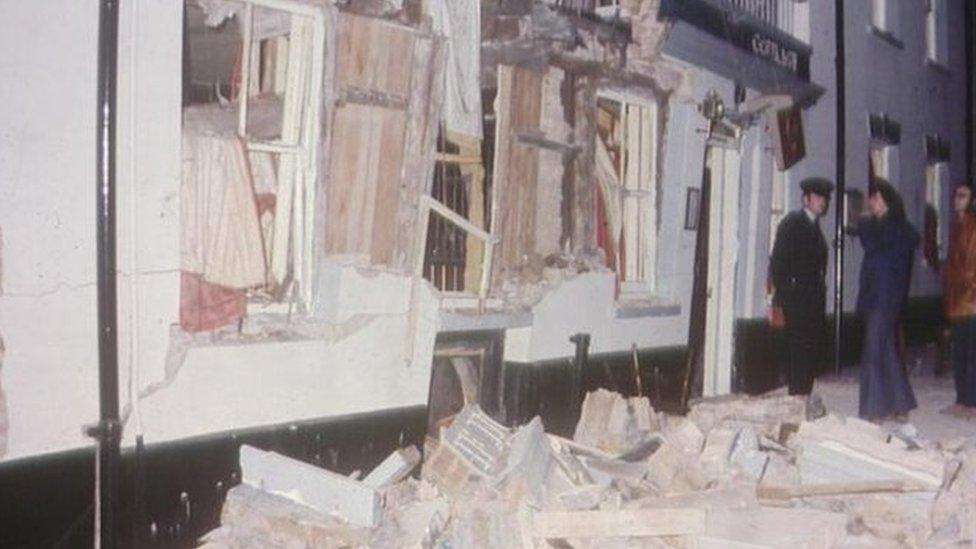
Two bombs went off in Guildford on 5 October 1974
Police investigating the 1974 Guildford pub bombings have "seized" archives and may destroy some of them, a memo seen by the BBC has claimed.
The records at Surrey History Centre were gathered by retired officers and deposited by ex-Ch Supt Bob Bartlett.
Correspondence said one file, dated 1967-74, covering the year of the bombs, had information on wanted people but "will be destroyed" on retention.
Surrey Police said no papers had been destroyed and files would be audited.
Five people were killed and 65 injured in the IRA attacks and 11 people were wrongly convicted and spent up to 15 years in jail.
For decades, questions have been asked about the police investigation after no-one else was prosecuted.
Lawyers representing the family of victim Ann Hamilton and survivor Yvonne Tagg in the resumed Guildford pub bombings inquest said if files were being retained, closed or marked for destruction, it raised "serious concerns".

Four soldiers and a civilian died in the first explosion at the Horse and Groom
Correspondence given to the BBC said police "entered the Surrey History Centre to recover any Guildford bombings related material because there is to be an inquest".
It said they "seized" files on 14 November covering both the terror attacks and other "diverse material" including retirement certificates, photographs of the Operations Room and pocketbooks, along with information on a rabies alert and disruption in the countryside, without consulting Mr Bartlett, who runs the Surrey Constabulary History, external website.
It also claimed "archivists felt compelled to comply with police demands" and went on to criticise the move as "over-interpreting the law" and "over-zealous".
The papers included an appendix setting out reasons given by Surrey Police for taking the documents, citing General Data Protection Regulation (GDPR), the Data Protection Act 2018, Management of Police Information (MoPI), the Public Records Act, the Freedom of Information Act and other guidance.
Files listed as withdrawn included a major incident handbook from the 1970s; photographs of the interiors and exteriors of the bombed pubs; and a file dated 1973-75 covering actions in dealing with incendiary devices, which were closed and may now apparently be retained for 100 years.
An open file containing four photographs of the pub bombing scene by war photographer and Fleet Street journalist Terry Fincher was also listed as retained while the force checked whether he was working for them.
Mr Fincher's daughter, Jayne Barlow, who holds his work in a separate archive, has said he was not working for the police.
'Secrecy and evasion'
Christopher Stanley, from KRW Law, said: "If files in the public domain which could have any relevance or significance to the pub bombings in Guildford, Woolwich and Birmingham - or the IRA bombing campaign in England between 1973 and 1975 generally - are being retained, closed or marked for destruction by the Surrey Police or other agency, then this is cause for serious concern.
"These files need to be independently assessed for their relevance, if any, to the resumed inquest and other inquiries and investigations which are ongoing or in the future - for example the current live investigation into the Birmingham pub bombings being undertaken by the West Midlands Police."
He said material that might have evidential value to answering questions about the Northern Ireland conflict was too often being destroyed, retained or closed by agencies of the state.
"The practice represents a corporate culture of secrecy and evasion which robs the relatives of victims of the conflict and survivors of the possibility of truth and reconciliation," he said.
This month it also emerged the Home Office had taken more than 700 files out of The National Archives in a move that campaigners said was "a disgrace".
The resumed inquest has also heard Surrey Police destroyed five boxes of police files "in error".

The wrongly convicted Guildford Four served 15 years in jail
Retired lawyer Alastair Logan, who represented the wrongly-jailed Guildford Four, said police had in effect seized private property and the basis they claimed for seizing the files needed to be legally examined.
He said the file covering 1967-74 that was apparently earmarked for destruction could be relevant to the inquest and to the history of the matter of the Guildford bombings, adding: "There appears to be no public oversight on what is happening."
"That file could point to people other than the Guildford Four as potential culprits - we don't know," he said.
"What is contentious is if it were to indicate that advance knowledge could have prevented the offences - that would be extremely important to the coroner."
On that particular file, the full reason for withdrawal stated in the memo was: "Breach of GDPR and unknown if any are MoPI 1. This information will be destroyed under MoPi guideline when it has reached retention."
The total number of files seized is not known but, of those listed as withdrawn, nine were requested by the BBC on 26 September when it was established many of Mr Bartlett's files held at the archives were closed.
That request went to the Surrey History Centre but a revised request has since been submitted to Surrey Police to see day book entries from 1974.
The BBC has been seeking to view first-hand records of police activity on the night of the bombings after hearing claims of a discrepancy in timings by Charles King, whose son Rob, a reporter who went on to work for national newspapers, was on the scene and insisted the first explosion happened 20 minutes earlier than the time given.
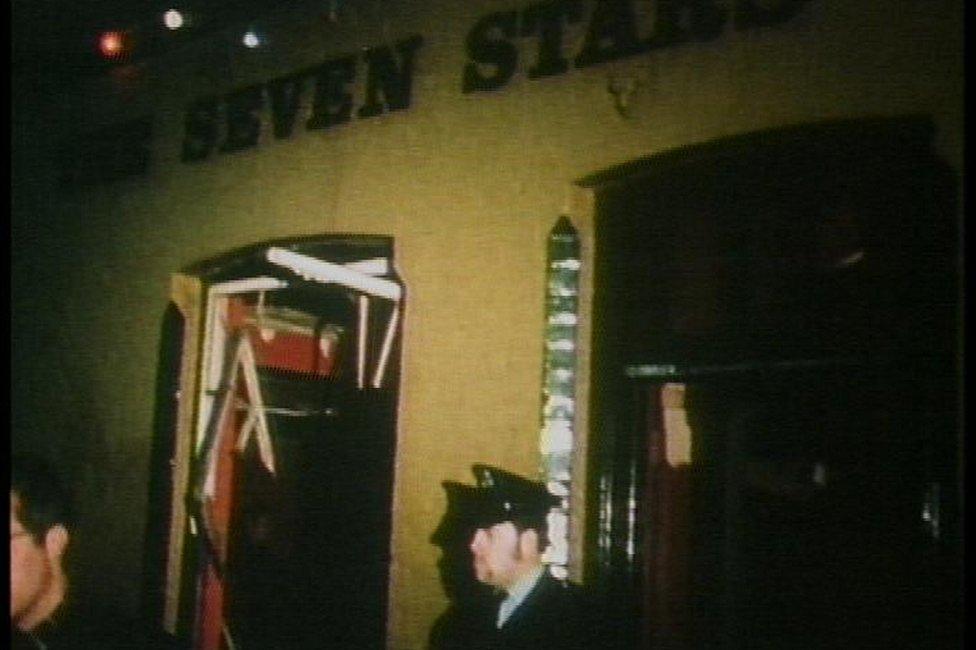
The bombs killed five people, injured 65 and saw 11 wrongly convicted
A statement issued by the force said: "Surrey Police fully recognises the importance of recording information for historical value and works closely with the Surrey History Centre to encourage and support the archiving of material where it is lawful."
It said it came to light last summer that alongside material deposited by Surrey Police through an agreed process, other material gathered by retired officers had been submitted directly by a former officer.
The statement said: "Material generated in the course of employment with Surrey Police should be submitted to the information management team who will assess and identify whether it is suitable for archiving.
"Submission of material directly to an archive does not satisfy our legal obligations. As the owner of this material and a data controller, Surrey Police is subject to strict guidelines."
Surrey Police met archivists last September to advise them the collection would need to be removed and audited and the centre agreed the removal "would be done by appointment" on 14 November, it said.
"None of the material has been destroyed," the statement added. "It will be audited against the relevant legal guidelines and, where possible, returned to the history centre."
It said any material that was still within retention must remain within the possession of Surrey Police.
A spokesman for Surrey's police and crime commissioner (PCC) said: "We have been informed that very little of the material in question relates to the Guildford pub bombings.
"The PCC was satisfied the action taken by Surrey Police, who are the owners of this material, was entirely appropriate to ensure the Force met its legal obligations."
Surrey County Council, which runs Surrey History Centre, said it was not its place to comment.
Related topics
- Published31 December 2019
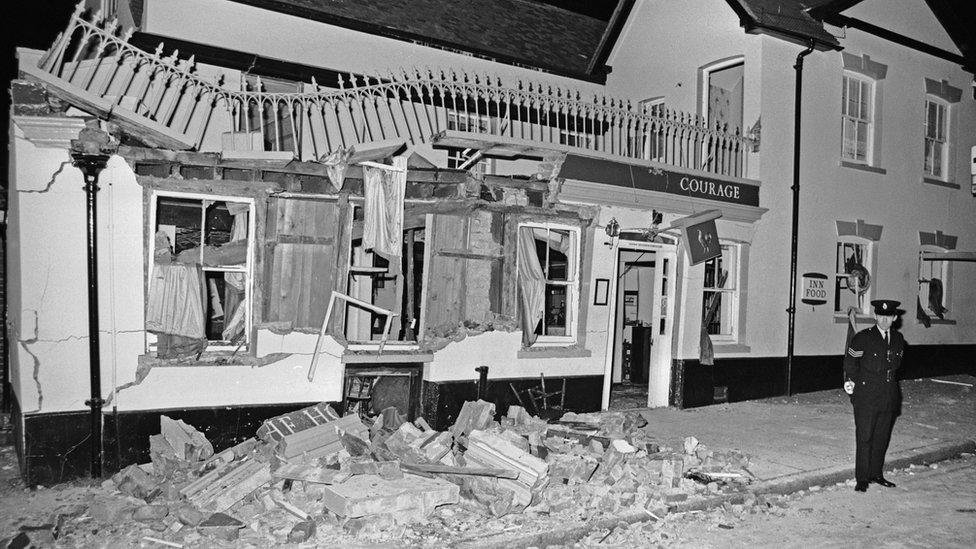
- Published22 July 2019
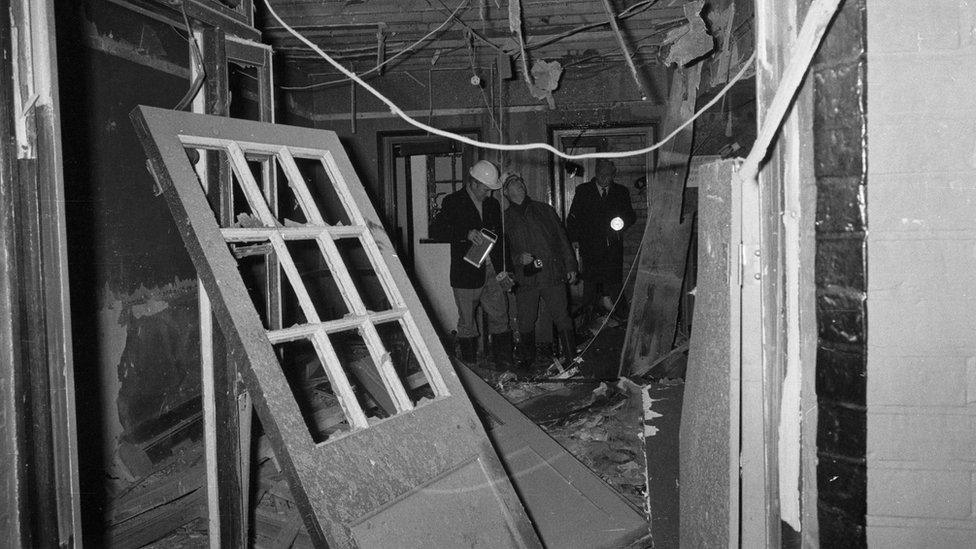
- Published20 December 2018
